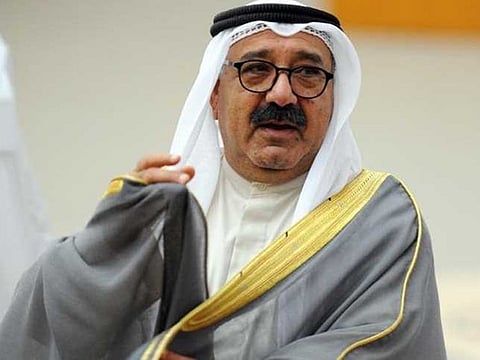Loss of a leader and visionary
Death of Sheikh Nasser Sabah Al Ahmed, former Kuwaiti Defence Minister, is end of an era

With the passing of Sheikh Nasser Sabah Al Ahmed Al Sabah, 72, Kuwait has lost a great leader who left a long-term vision for his country. The late leader aimed to place Kuwait on the same development path that is followed by the UAE and Saudi Arabia.
In addition to its end-goal of bringing about economic diversification, this path also aimed to build a sustainable development model that would ensure a decent life for citizens, especially in the post-oil era.
Sheikh Nasser was often hailed as the mastermind of the Kuwait Vision 2035. There is a reason for that. He carried unlimited ambitions to place his country among the region’s most economically and commercially advanced countries by taking advantage of Kuwait’s distinctive geographical location and direct links with the regional main markets, thus giving the country the opportunity to transform its economy into a more a dynamic one.
Someone who made the impossible possible
When you met and spoke with Sheikh Nasser, you felt his seriousness, perseverance, and sincerity of purpose to make the impossible possible and fulfil the goals of Kuwait’s vision.
He almost always enthusiastically talked about his future projects and ambitions for the economic, social and cultural transformation of Kuwait, even though he was fully aware of the difficulties that lay ahead.
As the son of the Emir, head of the Emiri Diwan and Minister of Defence, he was fully conversant with the nature of Kuwait’s societal and political structure — a society distinguished by being politically mature as is clearly visible in the country’s National Assembly (the Kuwaiti Parliament).
Sheikh Nasser was not only a politician but also a businessman and refined intellectual. He was a man of multiple interests. In the economic field, he worked hard towards laying the foundations for implementing the Kuwait 2035 vision in order to bring about a comprehensive developmental transformation. He took several practical steps by adopting many vital projects.
Paving way for Kuwait's full diversification
These include Kuwait’s agreement with China to embark on a joint investment at a total cost of $100 billion (with many projects like the Silk City and Northern Islands, which will enable Kuwait to make a qualitative leap to develop its economy). This is in addition to the giant Mubarak Port development project near the waterway of Bakhoor Abdullah, which will form a commercial outlet for Iraq and other neighbouring countries.
Sheikh Naser’s projects were also aimed to develop Kuwait’s forward links of oil, petrochemical and technology industries. This is set to revive and diversify the Kuwaiti economy, creating more jobs for Kuwaitis, and improving living standards.
The year 2035 will witness a paradigm shift in the field of energy, where the production of cars that run on gasoline will be reduced, and perhaps (gasoline-based cars) would be banned in some countries and replaced by electric cars. This means a possible decline in the demand for oil, the main source of income in oil-producing countries, including Kuwait.
Mindful of the volume of missed opportunities, he established the Kuwait Association for Protecting Public Funds, to harness more funds and investments and pump them into the local economy, which boosted the volume of investments, bolstered their effectiveness and enhanced the quality of government projects.
Needless to add Sheikh Nasser was an intellectual with multiple interests and visions, a humble individual with a cheerful spirit. This was reflected on his future projects that covered almost all economic, social, cultural and sports sectors. His interest in Arab and Islamic heritage, for example, prompted him to establish the Dar Al Athar Al Islamiyyah.
It is sad to lose a leader who possessed such enthusiasm, determination, optimism and sincere vision. Despite this grave loss, Kuwait is a capable land with its men and woman bearing great potential to continue what Sheikh Nasser started.
The country can achieve “Vision 2035” and implement the policies and plans contained therein, which will certainly lead to a qualitative shift in the structure of the Kuwaiti economy, making it more diversified and sustainable,
In hindsight it is always difficult to write about the personal qualities of a person when he or she is alive. However, and after one’s death, you get more room to grant such character to his/her personality and appreciate their efforts and dedication in serving their homeland.
May God have mercy on Sheikh Nasser, and may God bless his family and Kuwait.
Mohammad Al Asoomi is a UAE writer and expert on Gulf affairs






